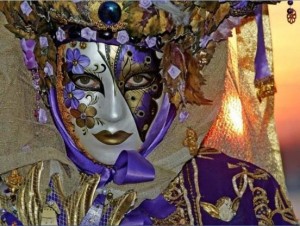December 24th, 2010 @ admin
JANUARY
New Year – some cities host outdoor events and fireworks, venice carnival.
Venice Carnival – dating back to the 13th Century, wearing of masks and elaborate outfits. Started so nobels could walk with locals unseen.
FEBRUARY
Turin’s Chocolate Festival – held in Umbria. Turin is home to Ferrero’s company (my favourite)! they also make Nutella and Kinder products.
Battle of the Oranges – an event held in Ivrea Northern Italy for 3 days, oranges are used as weapons in the city centre. Dress in period costumn oranges are used to symbolise a dukes head as an act of freedom and rebellion of Violetta, a lady who refused the duke.
MARCH
International Women’s Day – Bright yellow mimosa flowers are sold by vendors. People buy for the special women in their life. Very similar to our tradition of giving daffodils for mothers day.
Easter – parades are held, carrying of statues of Jesus or Virgin Mary through cities. Catholic masses take place in the array of churches. Another tradition are games on Easter Monday, egg races in Tredozio and wheels of cheese are rolled in Umbria.
APRIL
Liberation Day – Italians honor their soldiers, marching bands and music concerts held.
MAY
Labour Day – Annual holiday trade union demonstrations held to celebrate achievements of workers.
Music festival in Florence – concerts held, performing arts.
Flower festivals – held all over Italy.
JUNE
Battle of Bridge Piza – historic battle procession held who fought for possession of the bridge.
Anniversary of the Republic – national holiday to remember the referendum.
Festival of the Two Worlds – held in Umbria, classical music, arts, theatre ballet held.
JULY
Horse Race (Palioldi Siena) – Bareback horse race around Siena’s main square, dates back to 1600′s, held for one day in July and August.
Verona Opera Festival – opera held in the verona arena open air (Roman Ampitheatre) build in 30AD.
Verona Shakespeare Festival – celebrating a variety of Shakespears plays held at the Roman Theatre in Verona built on San Pietro hill, 1st century BC. Held July – August.
AUGUST
Assumption Day – a catholic public holiday celebration of the virgin marys descent into heaven after her death. Mass is held and flowers/candles are offered to the virgin mary. Procession of statues and fireworks held. The colour blue symbolizes Mary ‘truth, clarity, colour of the sky and heaven.’
SEPTEMBER
International Film Festival Venice – This takes place in Venice at the Lido (a narrow resort island), at the Palazzo del Cinema. One of the oldest film festivals, famous film actors attend and awards are presented. Nominees are announced in July.
Live Chess Match Marostica – held over a weekend one hour North West of Venice, a live chess match is played on a chess board with humans and in period dress on horses.
Regatta on the Grand Canal – Venice’s competition held since the 14th century, between venetian boats. Paintings dipict this scene around 1735, after the boats a historical procession is held.
Bareback horse ride (Palco di Asti) – The oldest bareback horse ride held in the town of Asti, Northwest Italy, dating back from 1275.
OCTOBER
Eurochocolate in Perugia – held in Perugia, Umbria the chocolate festival is held. Lots of visitors attend from all over the world. Cooking demos, chocolate spa, chocolate art, chocolate sculptures. Theres a different theme every year it was the original chocolate festival until other cities started their own.
NOVEMBER
Festival of the Goose in Marano – folk game held in Mirano, a short train ride from Venice, feast held in the main square, artists, jugglers, fine eaters, acrobats, puppeteers.
All Saints Day – a national holiday where all catholic saints are remembered. People bring flowers to their loved ones graves.
All Souls Day – souls of the deceased remembered.
DECEMBER
Feast of the Immaculate Conception of Mary – holy day, catholics attend mass.
Christmas – lots of nativity scenes are around to see on display outdoors and inside churches. The Italians exchange presents on 6 January not on Christmas Day as in the UK. There are not many Santa’s around Italy and he doesn’t bring childrens presents an old woman on a broom called La Befana does.


